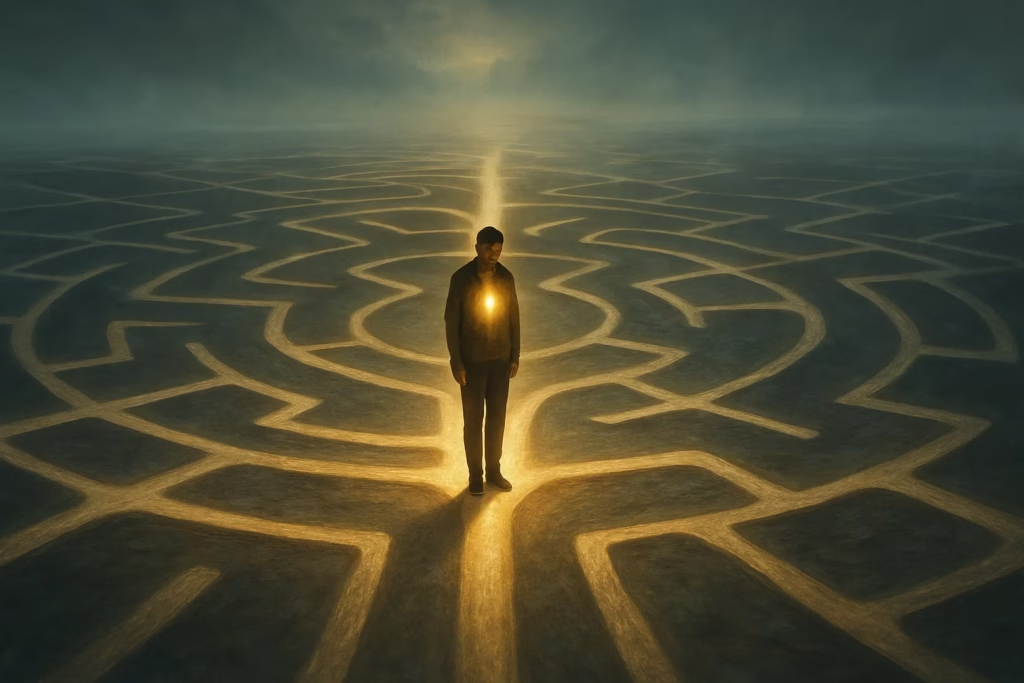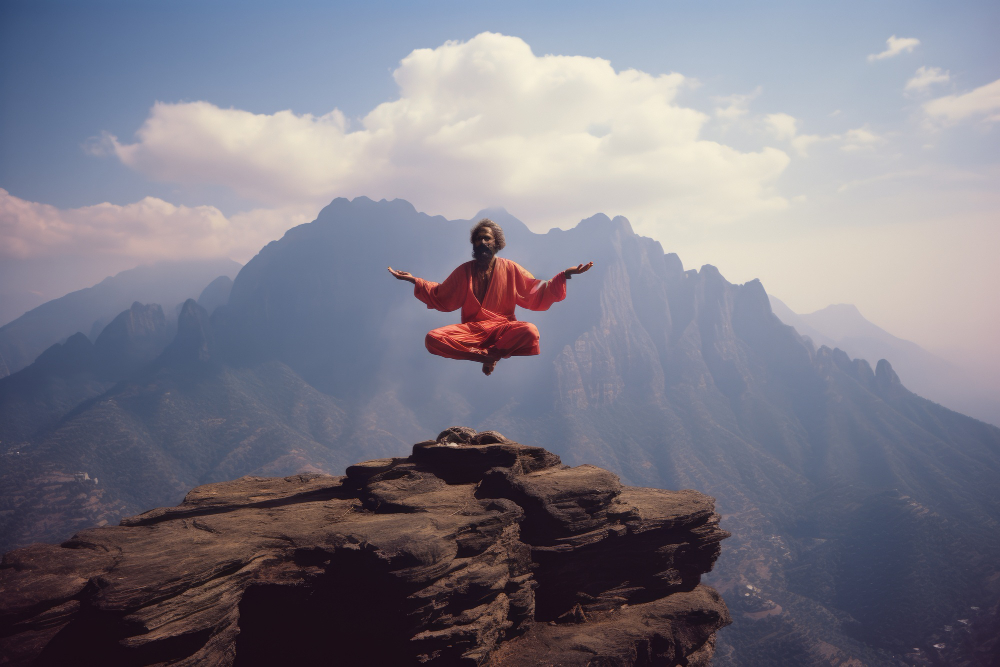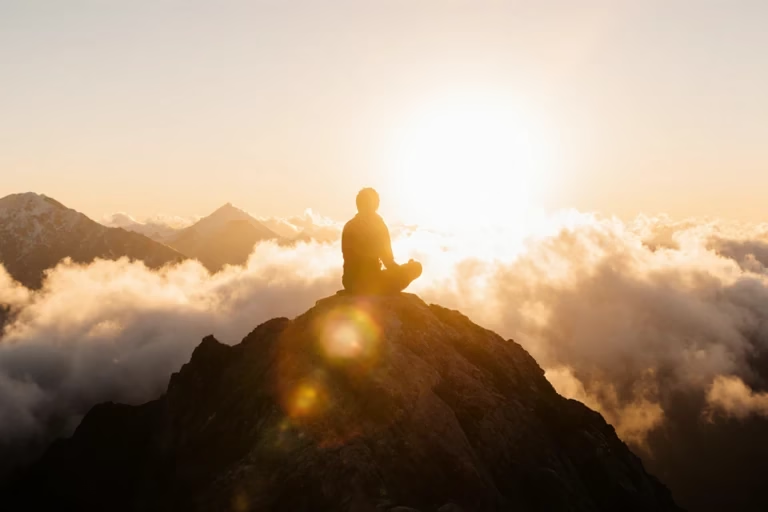Why does a dilemma make your decision-making more complex? How to Find Spiritual Clarity

Table of Contents
Why does a dilemma make your decision-making more complex?
You stand at a crossroads.
Not a simple fork in the road, but a complex intersection with multiple paths spiraling out into an uncertain future. Each option glimmers with potential, but each is also shrouded in mist. Your mind races, weighing pros and cons until the lists blur together. Your stomach is tight. Sleep is elusive. The question echoes on a loop: “What should I do?”
This is more than just a difficult choice. This is a dilemma. And it’s in this fraught space that we confront one of life’s most pressing questions: Why does a dilemma make your decision-making more complex?
The answer isn’t just psychological; it’s profoundly spiritual. A true dilemma is a battle fought not between options, but within the very architecture of your soul. It’s where the ego clashes with essence, where fear debates with faith, and where the logical mind meets its limits.
But what if this painful paralysis isn’t a problem to be solved, but an invitation? An invitation to evolve beyond the noisy mind and access a deeper, quieter, and infinitely wiser form of intelligence?
This is a guide to navigating the soul’s crossroads. We will first unravel the intricate web of why dilemmas are so uniquely paralyzing, and then we will walk through a transformative, four-step spiritual framework to find not just an answer, but a profound sense of peace and rightness, no matter which path you choose.
The Anatomy of Paralysis – Why a Dilemma is a Spiritual Quagmire- Why does a dilemma make your decision-making more complex?
To understand how to get out of a dilemma, we must first understand why we’re stuck. The complexity isn’t an accident; it’s by design. A dilemma, especially a significant one concerning relationships, career, or life purpose, activates every layer of our being in conflicting ways.
1. The Illusion of Equal Weight: A Battle of “Soul vs. Role”
A simple choice is often between a “good” option and a “bad” one. A dilemma, however, is typically a choice between two “goods” or two “bads.” This creates immediate paralysis.
- Two Goods: Do I take the high-paying, prestigious job (good for ego, security, status) or do I pursue my passion project that fulfills me (good for soul, joy, purpose)?
- Two Bads: Do I leave a stable but unfulfilling relationship (bad: loneliness, guilt) or stay in it and feel my spirit slowly wither (bad: regret, inauthenticity)?
This illusion of equal weight is the first layer of complexity. Logic fails because the calculus isn’t mathematical; it’s existential. You’re not weighing numbers; you’re weighing identities. You’re trying to compare the needs of your Role (the person society expects you to be) with the whispers of your Soul (the person you came here to be). They operate on different currencies, and no spreadsheet can reconcile them.
Read about emotional baggage and spiritual warfare here.
2. The Voice of Fear: The Projection of Future Suffering
At the heart of every dilemma’s complexity is a chorus of fears, each shouting a catastrophic prophecy:
- Fear of Making a Mistake (The “What if?”): “What if I choose wrong and ruin my life?”
- Fear of Loss (The “Door Closes”): Choosing one path inherently means losing the other. We mourn the phantom life we didn’t choose before we’ve even lived the one we did.
- Fear of Judgment (The “They”): “What will my family, friends, or society think of me if I choose this?”
- Fear of Regret: This is the master fear. It’s the terrifying anticipation of future pain looking back on this moment.
These fears aren’t passive observers; they are active participants. They amplify the perceived stakes of the decision, transforming a choice into a life-or-death verdict. This is why your body reacts with stress—heightened cortisol, anxiety, sleeplessness. You are, from a biological standpoint, under threat.
3. The Ego’s Dominion: When Your Identity is on the Line
Your ego is the constructed sense of self—your personality, your achievements, your story. A true dilemma often threatens this identity.
- The successful lawyer considering becoming a yoga teacher isn’t just changing jobs; she’s dismantling an identity she’s spent decades building.
- The people-pleaser considering setting a firm boundary isn’t just saying “no”; they are threatening their self-image as a “nice and helpful person.”
The ego will fight for its survival. It will rationalize, manipulate, and generate endless anxiety to maintain the status quo, even if the status quo is painful. This internal civil war between the ego’s desire for safety and the soul’s yearning for growth is the ultimate source of complexity. The decision-making process becomes a battlefield, and you are both the general and the soldier caught in the crossfire.
Learn about habits of spiritually awakened people here.
4. The Over-reliance on the Logical Mind
We are taught to be rational. We make pros and cons lists, seeking a clear, logical winner. But a dilemma exists precisely because it transcends logic. The soul doesn’t speak the language of pros and cons; it speaks the language of intuition, resonance, and inner peace.
Trying to solve a spiritual problem with only a logical mind is like trying to taste a rainbow with your ears. You’re using the wrong instrument for the task. The mind is a superb tool, but a terrible master. When it can’t find a definitive answer, it simply spins faster, generating more scenarios, more anxiety, and more complexity, leading to decision fatigue and paralysis.
The Spiritual Shift: From “What Should I Do?” to “Who Am I?”
The way out of this paralysis is not to try harder with the same tools that got you stuck. It’s to change the question itself and the consciousness from which you ask it.
The spiritual journey through a dilemma is not about finding the one “right” path promised by some external divinity. It is about awakening the inner wisdom to choose any path with consciousness, clarity, and peace, and to understand that no path is wasted on a soul that is awake and learning.
The fundamental shift is this:
Stop asking, “What should I do?” (a question of action rooted in fear and external validation).
Start asking, “Who am I, and who do I choose to become?” (a question of being rooted in essence and inner truth).
The first question seeks a destination. The second question is about aligning with your compass. When your compass is true, every path can become part of your journey home.
The 4-Step Spiritual Framework to Simplify Any Dilemma
This framework is a practice. It moves you from the noisy battlefield of the mind to the quiet command center of the soul.
Step 1: The Sacred Pause – Ceasing the War
Before you can find clarity, you must stop adding to the noise. You cannot solve a problem from the same level of consciousness that created it.
- The Practice: Literally give yourself permission to not decide. Set a time-bound moratorium on the decision (e.g., “For the next 48 hours, I will not try to solve this.”). This act alone removes the life-or-death urgency the ego has created.
- The Spiritual Principle: Non-Doing (Wu Wei). This is not passive resignation; it is active allowing. It is creating a hollow space—a vacuum—into which insight can flow. In the silence, the dust of fear and mental chatter can settle, and you can begin to see clearly.
- How to Do It: Spend time in nature without a goal. Sit in meditation not to “figure it out,” but simply to watch your breath. Engage in a mundane, physical task ( gardening, knitting, walking) to calm the nervous system and get out of your head.
Step 2: Energetic Inquiry (Why does a dilemma make your decision-making more complex?) – Feeling the Future Now
Your body and your energy field are more truthful than your mind. They can feel the resonance of a path long before your mind has rationalized it.
- The Practice: Instead of thinking about the options, feel into them. Get into a calm, meditative state. For each potential choice, vividly imagine you have already made it. Don’t just visualize the outcomes; feel the entire experience in your body.
- Imagine waking up tomorrow having chosen Option A. What does it feel like in your chest? Is there expansion or contraction? A sense of lightness or a heavy dread? Does it feel like freedom or a prison?
- Now, wipe the slate clean. Do the same for Option B. Feel it viscerally.
- The Spiritual Principle: The Wisdom of the Body. The body is a direct instrument of the soul. It registers truth through sensation (expansion, peace, warmth) and falsehood through sensation (contraction, anxiety, heaviness). The mind lies, but the body rarely does.
- Journaling Prompt: “When I imagine choosing X, the feeling in my body is… The story my fear tells about this is…”
Step 3: Dialoguing with the Voices – From Conflict to Counsel
The voices of fear and desire are not enemies to be destroyed. They are terrified parts of you that need to be heard with compassion. Their extreme demands often soften when they feel acknowledged.
- The Practice: Internal Parts Work. Sit down with a journal. Personify the different voices in your head.
- Let the “Voice of Security” speak. What does it want? What is it truly afraid of? (e.g., “I’m afraid we’ll end up homeless and alone!”)
- Let the “Voice of Freedom” speak. What does it crave? What is it afraid of? (e.g., “I’m afraid we’ll die with a heart full of regret!”)
- Let the “Voice of Others” (the people-pleaser) speak.
- Now, let your Wise Self, your Soulful Observer, respond. This is the part of you that is calm, compassionate, and unattached to any specific outcome. What does this wise self say to each of these frightened voices? “I hear you. Thank you for trying to protect me. I am safe. We will get through this together.”
- The Spiritual Principle: Integration over Force. Spiritual growth isn’t about killing the ego; it’s about integrating it into the service of the whole self. When the ego feels heard and safe, its frantic screams often become helpful whispers of practical caution, rather than paralyzing shouts of terror.
Step 4: Surrendering the Outcome – Trusting the Curriculum of the Soul
This is the ultimate spiritual act in decision-making. It is making the best choice you can with the clarity you have, and then releasing your white-knuckled grip on how it must turn out.
- The Practice: Take your hands off the wheel. After you have paused, felt, and listened, you will often arrive at a leaning—a sense of “rightness.” Act on that leaning. Make the choice. Then, affirm: “I trust that this choice is the next right step for my soul’s growth. I am open to the lessons and blessings it will bring, whatever they may be. I am safe on my path.”
- The Spiritual Principle: Dharma and Trust. This is the understanding that your soul is on a journey of learning. There are no wrong turns, only different lessons. A “mistake” is simply a curriculum you didn’t know you needed. Trust that life is happening for you, not to you. Your ultimate purpose is not a specific destination (a job, a relationship) but the expansion of consciousness you gain by walking your path with awareness.
The Alchemy of the Dilemma: From Paralysis to Initiation
The immense complexity of a dilemma is not a flaw in the universe’s design. It is its genius. It is a forced initiation. It forces you to stop outsourcing your authority to logic, society, or fear. It forces you to turn inward. It forces you to develop a relationship with your own soul. The agony of the crossroads is the pain of your old self struggling to give birth to the new.
The path you eventually choose is almost secondary to the consciousness you cultivate in choosing it. When you choose from a place of centered awareness, connected to your inner wisdom and trusting in the journey, you have already won. You have chosen yourself. You have claimed your sovereignty.
And in that space, the complexity of the dilemma melts away, not because the external circumstances have changed, but because you have. You are no longer a victim of your choices, but a conscious creator of your experience. The crossroads, once a place of terror, becomes sacred ground—the very place where you met yourself and decided to come home.


